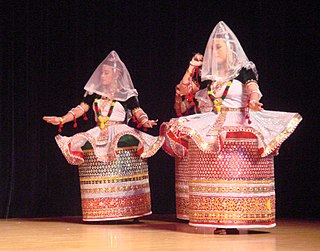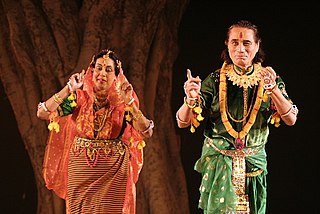Sougaijam Thanil Singh | |
|---|---|
| Born | Manipur, India |
| Occupation | Classical dancer |
| Known for | Manipuri dance, Nata Sankirtana |
| Parent(s) | S. Ksher Singh |
| Awards | Padma Shri Manipuri State Kala Academy Award Sangeet Natak Akademi Award Baidya Ratna Award |
Sougaijam Thanil Singh is an Indian classical dancer, known for his proficiency in the classical dance forms of Manipuri and Nata Sankirtana. [1] Born to S. Ksher Singh, a Manipuri dancer, in the Northeast Indian state of Manipur, he received his early training from his father as well as Guru Tombi Sharma, Guru Bhaigchandra Singh and Guru Koireng Singh. [2] Later, he studied Manipuri dance and Nata Sankirtana, under Maisnam Amubi Singh, renowned dancer and Padma Shri awardee, at the Jawaharlal Nehru Manipur Dance Academy, Imphal, securing a diploma and a post graduate diploma, respectively, in the disciplines. [1]

Manipuri dance, also known as Jagoi, is one of the major Indian classical dance forms, named after the region of its origin – Manipur, a state in northeastern India bordering with Myanmar (Burma), Assam, Nagaland and Mizoram. It is particularly known for its Hindu Vaishnavism themes, and exquisite performances of love-inspired dance drama of Radha-Krishna called Raslila. However, the dance is also performed to themes related to Shaivism, Shaktism and regional deities such as Umang Lai during Lai Haraoba.
Manipuri Sankirtana is a form of performing art involving ritual singing, drumming and dancing performed in the temples and domestic spaces in Manipur State in India. Through the performances which exhibit unparalleled religious devotion and energy, the performers narrate the many stories of Krishna often moving the spectators to tears. It is practiced primarily by the Vaishnava community in Manipur and by the Vaishnava Manipuri population settled in the neighbouring States of Tripura and Assam. "Sankirtana: Ritual singing, drumming and dancing of Manipur" was inscribed on the Representative List of the UNESCO Intangible Cultural Heritage of Humanity during the eighth session of the UNESCO Intergovernmental Committee meeting in Baku, Azerbaijan, held in December 2013.
Maisnam Amubi Singh was an exponent of the Indian classical dance form of Manipuri, and the founding supervisor of the Jawaharlal Nehru Manipuri Dance Academy. Singh, who was credited with pioneering solo dance in Manipuri, was the first winner of Sangeet Natak Akademi award from the state of Manipur which he won in 1956. He was honoured by the Government of India in 1970 with Padma Shri, the fourth highest Indian civilian award.
Joining his alma mater as a member of faculty, he rose in ranks to become the Pradhan Guru [2] and superannuated as the director of the institution. [3] He has performed on many stages in India and abroad. He is a Fellow of the Ministry of Culture of the Government of India and a recipient of the 1980 Manipuri State Kala Academy Award. [2] He received the Sangeet Natak Akademi Award in 1994, [4] followed by Baidya Ratna Award of the Manipur Sahitya Parishad. [2] The Government of India awarded him the fourth highest civilian honour of the Padma Shri, in 2005, for his contributions to Indian classical dance. [5]
The Ministry of Culture is the Indian government ministry charged with preservation and promotion of art and culture of India..

Sangeet Natak Akademi Puraskar is an award given by the Sangeet Natak Akademi, India's National Academy of Music, Dance & Drama. It is the highest Indian recognition given to practicing artists. The award earlier in 2003, consisted of Rs. 50,000, a citation, an angavastram, and a tamrapatra. Since 2009 cash prize has been increased to ₹1,00,000. The awards are given in the categories of music, dance, theatre, other traditional arts and puppetry, and for contribution/scholarship in performing arts.

Padma Shri is the fourth highest civilian award in the Republic of India, after the Bharat Ratna, the Padma Vibhushan and the Padma Bhushan. It is awarded by the Government of India, every year on India's Republic Day.





